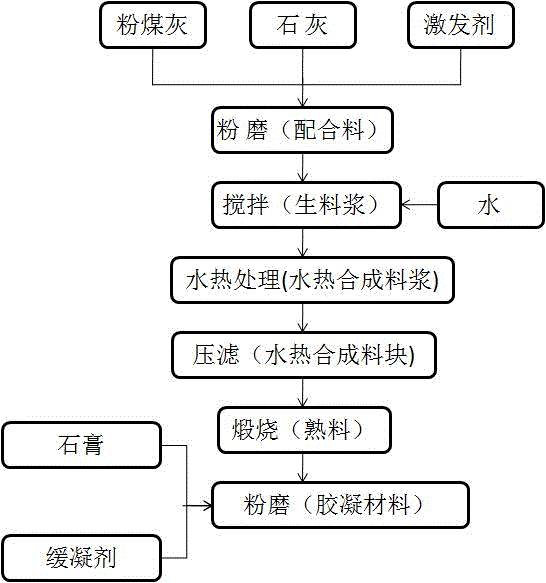A kind of cementitious material using fly ash as raw material and preparation method thereof
A technology of cementitious materials and fly ash, which is applied in the field of building materials, can solve the problems of poor product performance, less fly ash consumption, and high fly ash quality requirements, and achieve low equipment requirements, low emissions, and improved production Effectiveness and efficiency of equipment usage
- Summary
- Abstract
- Description
- Claims
- Application Information
AI Technical Summary
Problems solved by technology
Method used
Image
Examples
Embodiment 1
[0030] A cementitious material using fly ash as a raw material, wherein the batch material contains the following components in parts by mass:
[0031] 78 parts of fly ash
[0032] Lime 22 parts
[0033] Sodium hydroxide 0.5 parts
[0034] Weigh fly ash, lime, and sodium hydroxide according to the above mass ratio, and grind them together until the fineness is 80 μm and the sieve residue is 4.3%. Pour the batch into a mixer, add 150 parts of water and stir for 3 minutes to obtain raw Slurry: hydrothermally treat the raw slurry at 90°C for 14 h in a hydrothermal reaction tank to obtain a hydrothermally synthesized slurry, filter and dehydrate the hydrothermally synthesized slurry to obtain a hydrothermally synthesized block, and calcinate the block at 750°C for 120min Then blow air to cool to obtain clinker; take 92 parts of clinker, 8 parts of dihydrate gypsum, and 0.2 part of sodium gluconate to grind together to 3.4% of the 80 μm sieve to obtain a gelled material. The wat...
Embodiment 2
[0036] A cementitious material using fly ash as a raw material, wherein the batch material contains the following components in parts by mass:
[0037] 62 parts of fly ash
[0038] Lime 38 parts
[0039] Sodium carbonate 2.0 parts
[0040] Weigh fly ash, lime, and sodium carbonate according to the above mass ratio, and grind them together until the fineness is 80 μm, and the sieve residue is 2.8%. Pour the batch into a mixer, add 250 parts of water, and stir for 3 minutes to obtain a raw meal Slurry: hydrothermally treat the raw slurry in a hydrothermal reaction tank at 98°C for 16 h to obtain a hydrothermally synthesized slurry, press filter and dehydrate the hydrothermally synthesized slurry to obtain a hydrothermally synthesized block, and calcinate the block at 950°C for 30 min Then blow air to cool to obtain clinker; take 95 parts of clinker, 5 parts of anhydrous gypsum, and 1.5 parts of sodium phosphate to grind together to 2.9% of the 80 μm sieve to obtain a gelled ma...
Embodiment 3
[0042] A cementitious material using fly ash as a raw material, wherein the batch material contains the following components in parts by mass:
[0043] 70 parts of fly ash
[0044] Lime 30 parts
[0045] Sodium hydroxide 1.0 parts
[0046] Weigh fly ash, lime, and sodium hydroxide according to the above mass ratio, and grind them together until the fineness is 80 μm, and the sieve residue is 3.6%. Pour the batch into a mixer, add 200 parts of water and stir for 3 minutes to obtain raw Slurry: The raw slurry was hydrothermally treated at 95°C for 12 h in a hydrothermal reaction tank to obtain a hydrothermally synthesized slurry, and the hydrothermally synthesized slurry was press-filtered and dehydrated to obtain a hydrothermally synthesized block, which was calcined at 850°C for 60 After 1 min, blow air to cool to obtain clinker; take 94 parts of clinker, 6 parts of anhydrous gypsum, and 1.2 parts of sodium pyrophosphate to grind together to 3.5% of the 80 μm sieve to obtain...
PUM
| Property | Measurement | Unit |
|---|---|---|
| time | aaaaa | aaaaa |
| compressive strength | aaaaa | aaaaa |
| compressive strength | aaaaa | aaaaa |
Abstract
Description
Claims
Application Information
 Login to View More
Login to View More - R&D
- Intellectual Property
- Life Sciences
- Materials
- Tech Scout
- Unparalleled Data Quality
- Higher Quality Content
- 60% Fewer Hallucinations
Browse by: Latest US Patents, China's latest patents, Technical Efficacy Thesaurus, Application Domain, Technology Topic, Popular Technical Reports.
© 2025 PatSnap. All rights reserved.Legal|Privacy policy|Modern Slavery Act Transparency Statement|Sitemap|About US| Contact US: help@patsnap.com

